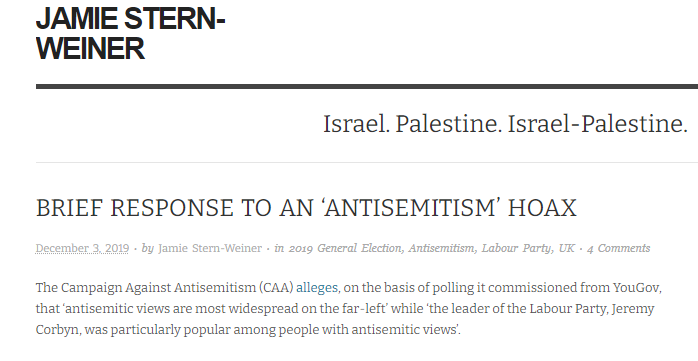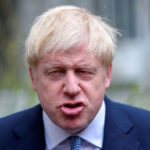Adapted from Jacobin magazine
In mid-October, a BBC journalist informed viewers that a report on antisemitism and the British Labour Party by the Equality and Human Rights Commission (EHRC) was “expected to be damning.” In fact, the process leading up to the report had already been comprehensively damning — of the EHRC, and of the media, which maintained silence in the face of the mass of evidence undermining the standing of the Commission’s inquiry.
The prolonged saga dates back to June 2019, when the EHRC announced it was investigating Labour for possible breaches of equality legislation, after receiving complaints from two (right wing Zionist groups) the Campaign Against Antisemitism (CAA) and the Jewish Labour Movement (JLM) which advised its members to not vote Labour in the 2019 general election without reprimand or sanction.
As far as British journalists were concerned, if the EHRC had taken such a decision, it could only mean Labour under Corbyn had become infested with antisemitism.
Of course, this assumption stands or falls on the credibility of the EHRC.
The Commission was established in 2007 bringing together the responsibilities of three previous bodies for enforcing anti-discrimination laws. Though formally independent, it relies on state funding.
The picture that emerges – of a body kept on a tight leash by the government, with the threat of further budget cuts if it crosses the line.

The EHRC’s budget was slashed by David Cameron from £63 million to £17.4 million today. In July 2020, two former EHRC commissioners told Newsweek that they had not been reappointed in because they were “too loud and vocal” about racism.
In 2016, Labour MP Harriet Harman, criticised the appointment of David Isaac as the new EHRC chair as Isaac’s legal firm did “significant work” for the British government. “As they say, ‘he who pays the piper calls the tune.’”
In November 2019, BBC’s Newsnight reported a letter from EHRC’s chief executive Rebecca Hilsenrath, in which she complained that Isaac, “regularly declines to take public positions” on issues that might prove troublesome for the ruling party.

In May 2019, the Muslim Council of Britain (MCB) asked the EHRC to “investigate whether the Conservative Party has breached its obligations under the Equality Act”.
The MCB submitted a lengthy dossier showing that the Conservatives had targeted Muslims in their election campaigns and allowed senior figures in their party – including its leader, Boris Johnson – to make bigoted, anti-Muslim remarks with complete impunity.
It listed dozens of abusive comments by Conservative councillors, election candidates, and other public representatives.
Receiving no response, the MCB repeated its call for an inquiry. The EHRC said it was mulling over the complaints. In March 2020, the MCB submitted a fresh dossier with more than three hundred allegations of Islamophobia.
Finally, one year after the MCB had lodged it’s initial complaint, the Commission declined the MCB’s request, because the Conservatives had promised to set up their own inquiry.
The EHRC’s decision to investigate Labour posed no such dilemma. Indeed, it was greeted with general acclaim by the press.
As a result, there was no meaningful scrutiny applied to the groups that had solicited the inquiry in the first place.
The Campaign Against Antisemitism is a grassroots campaign against antisemitism as much as the Taxpayers’ Alliance – which is to say, not at all.
Established in 2014, while Gaza was under heavy Israeli bombardment, the CAA prioritised attacking critics of Israel with trumped-up allegations of antisemitism. The Institute for Jewish Policy Research criticised an early CAA report as “littered with flaws” and “rather irresponsible.”
The group came to the fore in the campaign against Jeremy Corbyn, and even doctored its own survey (see Hoax below) of antisemitic attitudes in Britain, to generate negative headlines about the Labour Party.

For its part, the Jewish Labour Movement has always indignantly denied that it should be considered a pro-Israel lobbying group. However, the group’s then-chair, Jeremy Newmark, spoke alongside Netanyahu’s ambassador, Mark Regev, in a fringe meeting at the 2016 Labour Party conference, on the most effective strategies for undermining solidarity with the Palestinian cause.

In February 2020, the JLM co-hosted a Labour leadership hustings with Labour Friends of Israel. Journalist Robert Peston, who moderated the event, demanded that the candidates endorse the Nakba.
The JLM’s submission to the EHRC, was found to be stuffed with falsehoods, trivialities, misrepresentations, and non-sequiturs.
The section on Jeremy Corbyn, claims that “a video emerged showing Mr Corbyn in Tunisia in 2014 laying a wreath next to the graves of Black September terrorists, who murdered Israeli Olympic athletes in 1972.”
The men who carried out the Munich attack that year are in fact buried in another country.
Corbyn was accused of laying a wreath for the PLO commander Abu Iyad – which would be less objectionable than Tony Blair and David Cameron at the funeral of Ariel Sharon – but he’d done no such thing.
The section on Corbyn’s purported record also accuses him of saying that “Zionists . . . don’t understand English irony” and insisting that “Zionists” must have been code for “Jews.”
The reality was, Corbyn said nothing about Zionists as a general category of people: he was specifically addressing a small coterie of known Zionist yobs who were heckling the Palestinian ambassador at a meeting.
Corbyn’s put-down, relied entirely on the premise that the hecklers were English, unlike the ambassador.
The JLM submission claims Labour MP Ian Austin was subjected to antisemitic “victimisation” when he faced a disciplinary hearing for screaming abuse at the party chairman, Ian Lavery.
The JLM describes this as a “heated discussion about antisemitism,” although eyewitnesses did not report hearing Austin say anything about antisemitism as he referred to Lavery as a “bastard” and a “wanker.”
Austin, who once boasted that senior Labour figures had compared his views on immigration to those of the BNP, subsequently left Labour, campaigned for Boris Johnson and has since received a peerage.
After several years of wall-to-wall media coverage of “Labour antisemitism,” academic researchers asked members of the public to guess what percentage of the Labour membership had been disciplined for antisemitism. The average estimate was one-third: approximately three hundred times greater than the actual figure — barely 0.1 percent.
This vast gulf between perception and reality was a function of misleading reportage on a gargantuan scale, with few, if any, precedents in modern British history.
The fact that the JLM submission plays so fast and loose with the facts has obvious implications when it touches upon subjects where no record exists.
It beggars belief that the EHRC could have found sufficient basis for an investigation in this dossier, while brushing aside the MCB’s exhaustive inventory of Tory racism as an inadequate starting point.
The double standards applied to the Labour and Conservative Parties by the Commission would be visible from space.
Much like the BBC Panorama broadcast Is Labour Antisemitic?, which aired shortly after the EHRC announced its inquiry, the JLM submission leans heavily on the testimony of former Labour officials who accused Corbyn and his allies of protecting antisemites among the party membership.
A leaked report, prepared under the supervision of Labour’s former general secretary Jennie Formby, has since provided considerable evidence that these self-styled “whistleblowers” were themselves at best grossly incompetent in their handling of antisemitism complaints, allowing cases to pile up for months instead of dealing with them promptly. The handling of such cases indisputably speeded up when Formby replaced Iain McNicol in 2018.
However, too close a focus on the handling of complaints would neglect the big picture. The “Labour antisemitism” which has as much to do with actual incidents of antisemitism as “welfare fraud” has to do with real incidents of fraud – relies on the assumption that there was a dramatic upsurge in the prevalence of antisemitism among Labour members after 2015, to the point that the party became infested with antisemitic attitudes from top to bottom. This is where the deceit truly lies.
But the British media collectively decided that it was a matter of urgent national importance – sufficient to dominate the news cycle for weeks at a time – if a small handful of Labour members with no public profile, holding no positions of authority in the party, had expressed views that could be tendentiously presented as antisemitic.
The same media enabled a concerted effort to redefine “antisemitism” so that it no longer had much to do with prejudice against Jewish people and chiefly concerned attitudes toward Israel.
In a final twist, they denounced anyone who questioned this rickety construct as an “antisemitism denier.”
The “Labour antisemitism” narrative was a perpetual-motion device, capable of generating its own fuel for as long as Corbyn’s opponents deemed it necessary.
The principal shortcoming of the Corbyn leadership in this respect was its failure to defend itself robustly, instead of offering unwarranted concessions that bought days or weeks of peace at the expense of months or years of pain. But we will search in vain for any acknowledgment of that in the EHRC report.
Subscribe
Click here for a secure way to sign up, you will be supporting independent news. Click the button below.
Your Opinions
Disagree with this article? why not write in and you can have your say? email us




